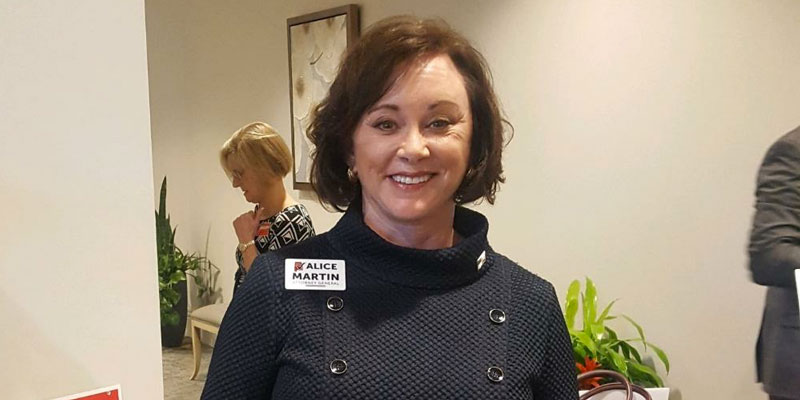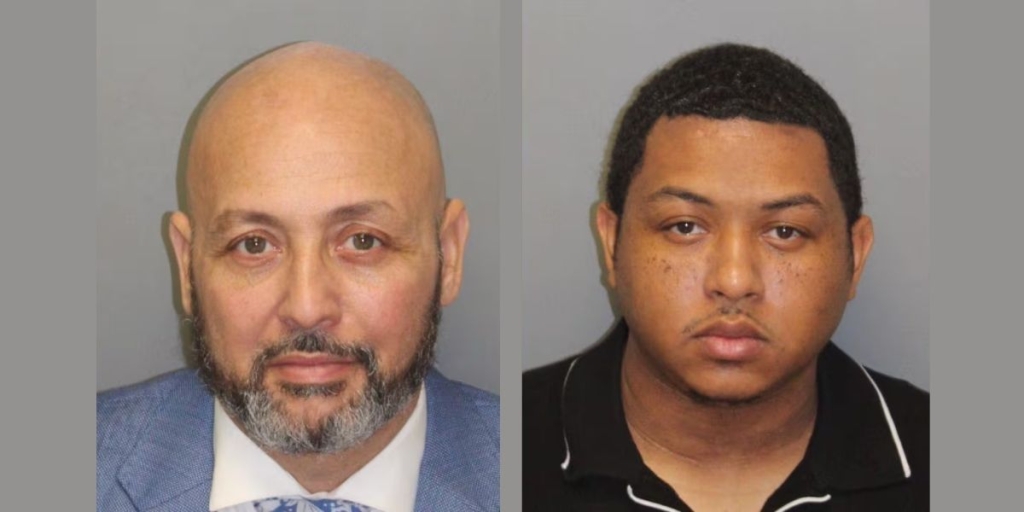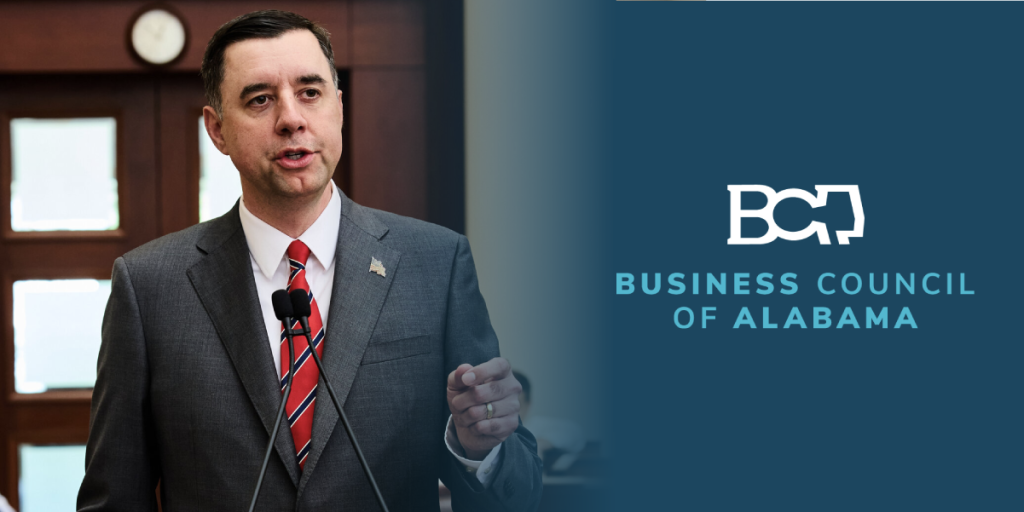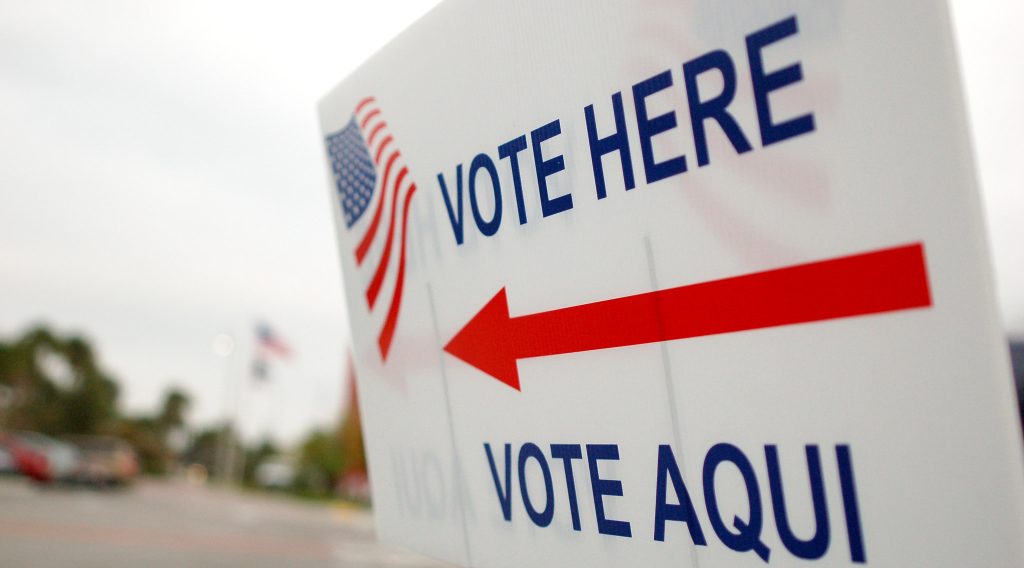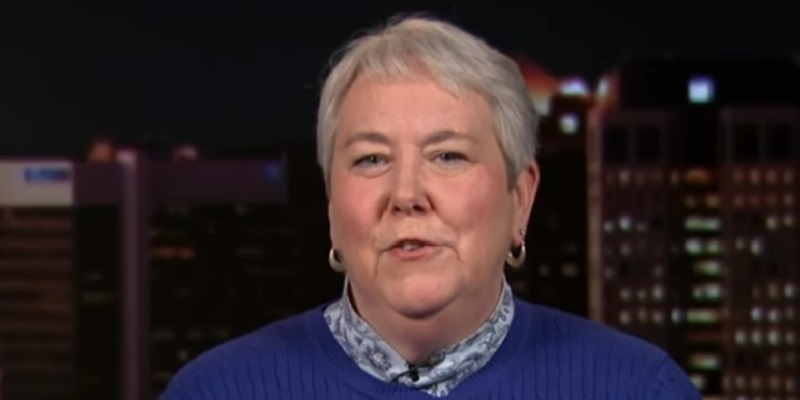Republican attorney general candidate Alice Martin recently responded to the questionnaire prepared by the Alabama Policy Institute and Yellowhammer News. Her answers are below.
ACTING PHILOSOPHY
Interpreting the Law
Question: Attorneys general are in the business of interpreting and enforcing the law. If elected, would you see your role as Attorney General (AG) as that of an activist, with freedom to interpret the law to new situations, events, and presidential administrations, or as that of a constructionist, interpreting the law strictly through the lens of original intent?
Martin: As Attorney General my interpretative method will be as a textualist and originalist guided by the words of the governing text. This shows respect for the rule of law and the separation of powers.
Enforcing the Law
Are you willing to aggressively defend state statutes and policies, even if you disagree with them?
Yes. Regardless of personal beliefs, it is the responsibility of the Attorney General to defend a state statute unless it is clearly unconstitutional.
Balancing Roles
How do you plan to balance your role as chief law enforcement officer in the state with your role as chief legal representative of the state?
As Chief Deputy Attorney General from 2015 to 2017, I balanced both roles and gave equal weight through executive leadership and providing strategic direction to the career men and women who ably serve Alabama in providing the day-to-day legal services. I will use that process as Attorney General.
More specifically, as chief law enforcement officer I will work with state, local and federal law enforcement colleagues to develop and execute a strategic plan to address violent crime, public corruption, economic crime, healthcare fraud and exploitation of children and the elderly in Alabama. Through 15 years with the Department of Justice I’ve experienced that collaboration through ‘joint task forces’ delivers greater success to communities. For example, as U. S. Attorney I formed the North Alabama Public Corruption Task Force with then AG Bill Pryor which obtained 140 federal corruption convictions and dozens of convictions in state court. I formed the North Alabama Healthcare Fraud Task Force which recovered $750+ million in fraud for the Medicaid/Medicare programs. And I oversaw the Organized Crime and Drug Enforcement Task Force which worked with chiefs, sheriffs and district attorneys in 31 counties to combat drug trafficking organizations that operated across jurisdictional lines. These experiences as a state, local and federal prosecutor for 20 years and over 5,000 criminal convictions, provide relationships and skills work strategically to benefit Alabama as chief law enforcement officer.
As chief legal representative we will balance providing legal opinions to various officials (required by law) with quality representation of the state in civil litigation while being proactive in defending and preserving the Constitution against liberal attacks on religious liberties, personal freedoms, gun ownership rights, and the sanctity of life. The AG is the tip of the spear in protecting these freedoms, as well as the last line of defense for states’ rights against federal overreach which can impose unnecessary regulation. Of great importance will be the Consumer Protection Division to protect consumers against fraud and dangerous products. Having resolved over 10,000 cases in state and federal court in Alabama I am prepared to balance the civil and criminal responsibilities of the office.
MANAGEMENT
Budget and Staff
The AG oversees a staff of more than 160 and a budget of over $10 million. What has prepared you to lead such a large organization and to be a responsible steward of taxpayer dollars?
Past experience. I successfully led the Office through three fiscal years 2015-2017, without layoffs and near level funding requests. This was especially challenging in 2015, when the legislature provided no funding to the Office.
While the Office receives $10+ million from the general fund, it actually requires $24+ million to operate annually. So, there are two challenges to funding: (1) effective advocacy to the Governor and Legislature to ensure funding is increased and not reduced, and (2) proper management of revenue generating services within the office. While serving as Chief Deputy Attorney General, I successfully navigated both challenges despite the legislature provided the Office no funding in 2015. Yet we worked with the Governor and Legislature to restore funding in FY16. We also successfully and creatively managed the revenue generating services of the Office to ensure that we could fully serve the state and its people. For example, in the fourth quarter of 2015, we faced a 15% layoff. If we had not earned the $10 million attorney fee awarded in the BP oil spill litigation, layoffs would have occurred. Following that close call, I directed efforts to improve revenue generation through: (1) negotiation of new legal services contracts with state agencies and boards (to whom we were not required by law to provide services) to increase our hourly legal fee from $50/hour to a more market rate; (2) reallocation of staffing to the Consumer Fraud Division so Alabama could participate in more multi-state litigation and earn attorney fees and greater recovery for the State; and (3) increased collection efforts for registration fees due the Office. These measures generated operating revenue needed for 2016, 2017, and 2018.
In addition to this fiscal leadership experience, I have 10 years of budget experience as U.S. Attorney and as Vice President of the Ethics and Compliance Division for a multi-state $1 billion healthcare organization. I also have served on the Office, Management and Budget Subcommittee of the Department of Justice’s Executive Office of United States Attorneys responsible for 93 U. S. Attorneys’ Offices.
Prosecutorial Discretion
Given limited resources, the AG must use discretion in deciding which crimes to prosecute. What is your overall position on the extent of prosecutorial discretion? Should prosecutorial discretion ever be used to avoid prosecuting an alleged corrupt government official? Do you think a prosecutor ever has the right to not prosecute a broad range of accused people/crimes?
As a prosecutor for 20 years I have exercised prosecutorial discretion based on principles that focus on consistency in the decision-making process and fair administration of justice, while recognizing the reality that resources are limited and must be managed. This to be especially true in economic crimes as opposed to violent crime, where resource expenditures may exceed the potential recovery. However, potential monetary recoveries do not control charging decisions, and that is especially true in public corruption cases where the deterrence message of prosecuting a corrupt official may outweigh monetary recovery. For example, a court clerk who is not prosecuted for stealing $10,000 may impact the local community, and potentially communities across Alabama, if it leads other public officials to believe they will not be held accountable under Alabama’s Ethics Law. My goal is to preserve public trust and faith in government and put corrupt officials on notice that they will be held accountable as public servants.
ETHICS
Code of Ethics
Both the current and the preceding AGs proposed comprehensive reforms to Alabama’s ethics laws. The Legislature recently established a Code of Ethics Clarification and Reform Commission “to reform and clarify the Code of Ethics”. The AG will co-chair this Commission with the Ethics Commission Director. Would you recommend amendments or revisions to the ethics code? If so, what are your suggestions in doing so?
Yes, I would recommend amendments to the ethics code to clarify and strengthen existing law and those recommendations are contained in HB343 which was introduced in the 2018 legislative session at a press conference. However, the leadership immediately ‘kicked the can’ down the road in this election year and created a study ‘Commission’. I favored action in 2018, since this had already been studied from the fall of 2016 through early 2018 with the Ethics Commission, defense lawyers, and various parties interested in and subject to the Ethics Act. It was time for action in 2018, but election year politics prevailed. As Attorney General I would have rejected participation in the “Commission” and stood with the strong HB343 to protect the people who are tired of special interest receiving special treatment in Montgomery.
While the Alabama Attorney General’s office is one of the state’s largest legal offices, it has been a common practice for AGs to outsource lucrative legal work to politically connected law firms. The firms often then contribute large sums to the AG’s campaigns for reelection or higher office. Is this an example of the AG using the powers of the office for personal benefit? If so, how will you make changes to this practice?
Alabama lawmakers tried to address this concern in 2013 by adopting a more transparent contracting process (Alabama Code 41-16-72) requiring the AG to make a “determination of necessity” that any outsourced legal work was both cost-effective and in the public interest. The legislature enacted this law following reports that former AG King’s retained a private law firm in the BP oil spill litigation under a lucrative contingency fee contract. AG Strange cancelled that contract in 2011, reportedly allowing the state to recover an additional $130+ million instead of it going to the private law firm.
Outsourcing can create the problematic optic of a private firm being rewarded, and empowered with the powers of the office, for political support. I have that concern with the February 2018 contract entered by AG Marshall with two private firms in the opioid litigation. The bare bone statements of why the contract was necessary, combined with the large contributions made by those firms engaged to AG Marshall’s campaign just months before this contract, illustrate the questions these contracts can raise and the wisdom behind the 2013 law.
When I served as Chief Deputy AG, several firms approached the office about contingency contracts to sue corporations on behalf of the state. The AGO did not enter such contracts instead opting to use in house expertise to represent the state and maximize recovery to the state. As AG, if I determined outsourcing would provide the best representation for the state in a cost-effective manner, my administration would provide a detailed “determination of necessity” document for public review.
Ethics and Economic Development
Alabama House Bill 317 exempts certain economic developers from being required to register as lobbyists and drew heated discussion across the state this past legislative session. Is this exemption, in your opinion, as innocuous as proponents claim or likely to lead to abuse as opponents suggest?
In my opinion this exemption is likely to lead to abuse. I objected to HB317 when it was introduced and outlined my concern that lobbyists will exempt themselves from the Alabama Ethics Law merely by calling themselves ‘economic development professionals’. Likewise, principals may call themselves ‘economic development professionals’ to try to muddy the waters as to how the law applies to them. With no definition of an ‘economic development professional’, no educational requirements, and no credentialing body provided by this law, as well as the extension of the exemption to ‘less than full-time’ economic development professionals, the exemption is a glaring ‘red flag’ carve out to benefit special interests. It removes their activities from the needed transparency and accountability of our ethics laws. A narrow exception, for true economic site developers could have been developed, but it was not. Make no mistake, as a member of the Mike Hubbard prosecution team, I can attest that HB317’s enactment will make prosecuting public officials who corruptly take things of value from lobbyists or principals much more difficult. It is fortunate that it sunsets in one year, but that also begs the questions why it was so needed.
INDIVIDUAL RIGHTS
Campus Free Speech
U.S. Attorney General Jeff Sessions recently said there is “too much suppression of free and open speech on college campuses today.” Do you believe this is an issue in Alabama and, if so, how should the AG respond?
Students do not lose their freedom of speech upon entry to a college campus. While I have made no independent review of campus speech policies in Alabama, a review by the Foundation for Individual Rights in Education (FIRE) reports finding restrictive policies on numerous campuses. If unconstitutionally restricted speech policies exist the AG should respond by encouraging policy reform through campus policymakers, or by promoting legislation through the legislature.
Religious Liberty
Do you think that individuals and small business owners should be forced to participate in activities that violate their religious beliefs in order to comply with anti-discrimination laws?
No. Religious freedom was a bedrock for our founding fathers and is a constitutionally recognized freedom that must be protected.
FEDERAL ISSUES
Federal Overreach
When Texas Governor Greg Abbott was the Lone Star State’s Attorney General, he made headlines by saying, “I go into the office, I sue the federal government, and I go home.” What role should the AG take in fighting federal government overreach? Would you be willing to file suit—and use state resources—to prevent such overreach?
The role of the Alabama Attorney General is to employ the last line of defense for a state’s rights – the Tenth Amendment – when the federal government overreaches. As a principled federalist, I will protect our state’s rights by filing suit and using state resources if federal overreach occurs as it did during the Obama Administration in regards to immigration, environmental, and religious liberties issues.
Immigration
Many state attorneys general have sued the Trump administration for ending the Deferred Action for Childhood Arrivals program. On May 2, 2018, Alabama joined six other states suing to end the program permanently. In your opinion, how effective is this form of joint action and how do you plan on upholding Alabama immigration law if executive action on the federal level runs contrary?
Joint action by states’ attorneys general can be very effective in persuading and educating the court. The Supreme Court has consistently held that the federal government has broad and exclusive power to regulate immigration, often preempting state and local laws that impact immigration issues. Any executive action that ran contrary to Alabama immigration law, but was permissible under federal authority would have to be carefully reviewed to determine if it violated the Tenth Amendment.
Opioid Epidemic
According to the CDC, Alabama is the state highest-prescribed with opioids, with more prescriptions than people. Opioids are the main driver of overdose deaths and, in 2016, 756 Alabamians died from drug overdoses. As AG, how would you address Alabama’s share of this national crisis?
The opioid crisis is both a public health and a public safety issue. As a former registered nurse and prosecutor, I believe we must address this crisis through a multi-disciplinary approach involving education/prevention, treatment, and law enforcement. Our partners are medical providers, public health officials, legislators, faith-based community, educators and law enforcement. In order to combat the crisis, I would continue efforts started in 2015 and provide leadership to execute the Governor’s State of Alabama Opioid Action.
Education: In 2015, as Chief Deputy AG, the AGO worked to educate prescribing partners that Alabama had an ‘over-prescribing problem’ with 2.4 active prescriptions for every man, woman and child in the state, the highest in the nation. The AGO noted the lack of narcotic prescribing education, the lack of Prescription Data Monitoring Program (PDMP) utilization and the need for chronic pain management for those in need. I held meetings with medical and pharmacy board leaders and investigators in 2016, and discussed proactive steps. In 2017, the Alabama Board of Medical Examiners adopted new regulations, effective January 1, 2018, that require mandatory education for controlled substances certificates every two years and mandatory PDMP checks when prescribing certain amounts of opioids.
In 2016 I attended the National Association of Attorneys General’s (NAAG) 2-day Opioid Abuse: Consumer Protection and Enforcement Training, a course specifically designed to teach attorneys general staff, investigators, and other allied professional about opioid education and enforcement. We planned to bring this training to Alabama in 2017, before a change in leadership. Bringing this training to Alabama would be a top priority under my administration.
Treatment: As a former RN, I recognize Alabama needs additional drug treatment facilities to deal both with substance addiction and chronic pain management. Opioid addiction treatment reportedly takes an estimated two-years and requires drug therapy. We will need to make treatment available to those who need it and de-stigmatize the label of ‘addict’ in public conversations to encourage affected patients to seek help rather than turn to street drugs like heroin. Facilitating these difficult conversations necessarily will involve public health officials, medical providers, lawmakers, the faith-based community, and educators. As AG, I would partner with leaders in each of these groups and use all available resources to try and obtain additional funding through grant programs for the state.
Law Enforcement: Currently there is no tool to prosecute a prescriber who writes a prescription without a legitimate medical reason, i.e. a ‘pill mill’. Legislation was proposed in 2016, but failed under industry pressure. This legislation is needed and would be a top legislative priority for 2019. The AG’s Office will also work to prosecute and support District Attorneys’ prosecution of individuals and organizations that traffic in heroin, fentanyl, and other opioids.
RULE OF LAW
Civil Asset Forfeiture
Some states are eliminating provisions that allow police to seize property without securing a criminal conviction. Would you support legislation that reforms the use of civil asset forfeiture by law enforcement and the provision that allows agencies to keep the proceeds of seized property? Why or why not?
Yes, I would support legislative reform of Alabama’s civil asset forfeiture laws. I support the seizure of criminal ill-gotten gains where there is a criminal conviction. However, in matters where there is no conviction or even a charge, reform of existing law would ensure that a presumption of ‘guilt’ does not flow to an innocent property owner. There needs to be a protection of due process rights for innocent property owners and safeguards of transparency and reporting to protect against so-called ‘policing for profit’.
Prison Reforms
Alabama has received national attention for the state of its prisons and a federal judge recently called inmate care “horrendously inadequate”. How would you address this issue, and do you support the use of private prisons?
While this issue must ultimately be addressed by the Governor and Legislature, one prudent reform would be to expand drug courts, mental health courts, and veterans’ treatment courts to help relieve prison overcrowding while also improving access to much needed rehabilitation and treatment services. While corrections and criminal justice reform experts are best qualified to formulate a strategic plan for prison reform, as AG my focus will be to ensure that any reform does not create a ‘‘catch and release’ environment that jeopardizes the safety of law abiding citizens. I often here local law enforcement say that with current ‘presumptive sentencing guidelines’ and the new Class D felony in Alabama, jail has become a ‘bus stop’ and street criminals know that they will not be held accountable under the current prison reform scheme. While I am not opposed to community corrections programs, diversion programs, and re-entry programs, my principal mission as AG will be to evaluate any changes to the prison system in terms of their impact on community safety.
I do not categorically oppose private prisons; however, Alabama should be cautious in light of the pros and cons experienced by other states who have experimented with private prisons.
Gaming
In its 2009 Cornerstone decision, the Alabama Supreme Court held that local laws in Alabama legalizing “bingo” games for the benefit of churches and other charities authorized only the old fashioned, or “traditional” game commonly known by that name. The Court upheld this interpretation of Alabama’s constitution multiple times over seven years after Cornerstone. In light of the Alabama Supreme Court’s decisions on this issue, should casinos—like the ones operating in Macon and Greene Counties—be allowed to operate as they are today? Explain your answer in detail, including whether you consider Alabama Supreme Court decisions on matters of Alabama law to be “the law of the land.”
The Alabama Supreme Court has consistently interpreted the Alabama Constitution to ban gambling and made clear that any exception to the ban based on a local amendment, like amendments that allow the playing of bingo in certain counties, must be narrowly interpreted. Since the Alabama Supreme Court is the highest court of this state, its rulings are the law of the land. As AG it would be my job to enforce the law consistent with those rulings. Accordingly, if a casino in Alabama is engaged in illegal gambling, I would take appropriate action to enforce the law.
In 2009, the Governor of Alabama appointed a special task force to enforce the gambling laws of Alabama in the absence of any action by the then Attorney General to shut down or prosecute the operation of gambling machines in Macon, Greene and other counties. This action by the Governor succeeded in shutting down casinos in these counties. Should that enforcement action have been taken by the Attorney General instead of the Governor?
Yes, the enforcement action should have been taken by then AG King rather than Governor Riley. The failure to act timely allowed the illegal activity to continue and proliferate, resulting in over 10 years of litigation in multiple counties in the state.
The Indian Gaming Regulatory Act allows certain Indian tribes, including the Poarch Creek, to conduct gaming operations on reservation land if such operations are permitted by the law of the state in which those reservations are located. Numerous Alabama Supreme Court decisions have been written arguing that electronic machines of the nature at issue are illegal under Alabama law. Should these machines continue to be permitted on Indian reservations within the State of Alabama? If elected Alabama Attorney General, would you work with the United States Attorney General to make sure that the all gambling laws, including federal law applicable to Indian reservations, are properly enforced?
The State of Alabama sued to stop electronic machines on Poarch Creek territory in federal court. On September 2, 2015, the Eleventh Circuit Court of Appeals held that the state had no jurisdiction to regulate gambling on the Poarch Creek reservation. When elected I will work with United States Attorney General Jeff Sessions to ensure all gambling laws, including federal law applicable to Indian reservations, are properly enforced.




